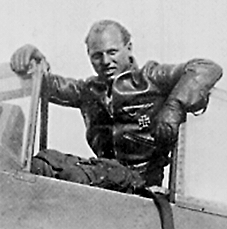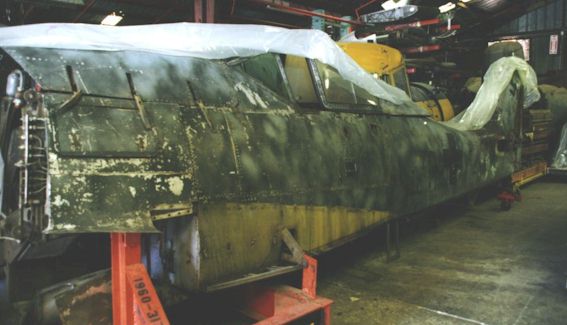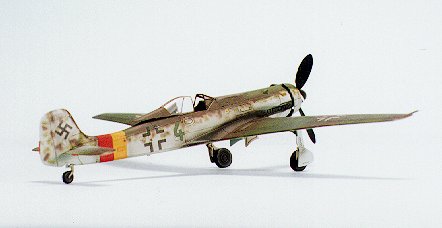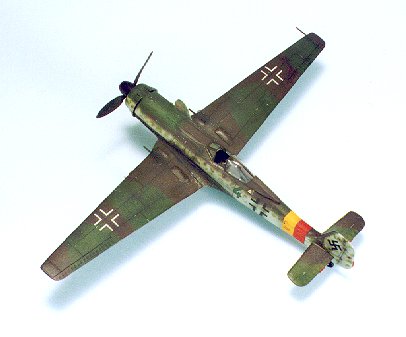|
Ta152H-O
"Green 4" WNr. 150010 |
|
Ta152H-O
"Green 4" WNr. 150010 |
B a c k g r o u n d |
Walter Loos was one of the last German Experten. He came as a newly-trained pilot to the III./JG 3 in January 1944, and was one of the few new pilots of 1944 who survived the war. He claimed his first aerial victory during a fierce aerial battle when the 8. US Air Force attacked Berlin on March 6, 1944.
 While with the "Sturmgruppe"
IV./JG 3, he downed several four-engined bombers and was hand-picked by Walther Dahl for Geschwaderstab/JG
300. Loos made a great success as a Sturmflieger, but was himself shot down nine
times in only a few months.
While with the "Sturmgruppe"
IV./JG 3, he downed several four-engined bombers and was hand-picked by Walther Dahl for Geschwaderstab/JG
300. Loos made a great success as a Sturmflieger, but was himself shot down nine
times in only a few months.
Stab/JG 301 was equipped with the Ta 152, the most modern propeller-fighter, in order to protect the bases of the jet-fighters from Spring 1945. It was natural to include Loos in this unit. On April 24, 1945, Loos encountered a formation of Soviet fighters over Berlin and managed to down two of them. In spite of flying only 66 missions, he was credited with 38 confirmed victories (including 22 four-engined Americans and 8 Soviets) plus 8 unconfirmed victories.
It should be noted that the werknummer (serial-number) of this, the only surviving Ta 152, could not be confirmed. Some sources quote it W.Nr. 150010, which is quite possibly correct.
This aircraft is currently awaiting restoration at the Paul Garber facility of the Smithsonian Institute NASM in the USA. Some excellent pictures of the aircraft in storage may be seen at Gary Hethcoat's Web Site. Go to the "Direct Link to Images Directory" section and look up the "fockewulf ta152" images. Lots of museum images of other interesting types too.

Gary has kindly permitted the use of this image on HyperScale
A o s h i m a ' s T a 1 5 2 H - 0 i n 1 / 7 2 |
The Kit
The kit is the Aoshima 1/72 scale Ta152H-O "Ace Fighters Story".
The box contains four nicely moulded sprues in light grey plastic and features fine
recessed panel lines with crisply moulded integral exhausts, alternate engine cowlings
(with either open or closed cooling louvres) and a choice of either a closed one piece
canopy or open two piece canopy.
Instructions
The instructions contain a "story" of the development of the
Ta152 plus a small biography of Walter Loos, unfortunately all in Japanese with the
obligatory cartoon "manga" characters sprinkled liberally within! The sub-
assembly drawings however are clear with four stages of construction, decal placement and
a RLM colour painting guide which list Gunze Sangyo paint numbers. A parts breakdown is
also included.
Construction
The construction was straightforward and the kit parts fitted well. A little filler was needed at the trailing edge wing root to fuselage join. The cockpit detail is fairly spartan, decals being supplied to simulate the instrument panel and cockpit sidewalls. The pilots seat is over scale with no detail. The kit "Morane"antenna and DF loop are also over scale so I replaced these with Eduard Photo Etched items. The kit cannon barrels were replaced with brass tube.
I replaced the entire cockpit tub with the True Details FW 190A/D/F Cockpit Tub detail set (TD72454). My thanks to Mr Green for providing this little item!
And now the difficult part! The True Details set is for the Hasegawa Fw190
kit and is a little too wide to fit into the Aoshima kit. I had to do some careful
scraping and shaving away at the inside of the fuselage walls to get it to fit. I did not
want to cut away the resin cockpit sidewalls as this would have obliterated the finely
moulded detail on the side consoles. Once enough material was removed the resin cockpit
was easily installed.
Painting and Decals
The kit instructions show a colour scheme of RLM 76 lower wing surfaces and fuselage sides with a scheme of RLM 83 & RLM 75 on the upper wing surfaces and fuselage top with the spinner in black with a white spiral. The box art illustration however has a scheme of RLM 76 lower wing surfaces and fuselage sides with a scheme of RLM 82/83 on the wing upper surfaces a scheme of RLM 81/83 on the fuselage top with a RLM 83 spinner. Neither of which appear to be correct for this particular aircraft!
I chose to depict the aircraft in the scheme found in Claes Sundin & Christer Bergstrom's Luftwaffe Fighter Aircraft in Profile by Schiffer Books. A profile of this aircraft, kindly supplied by them, can be seen below. A review of this book may be seen here on HyperScale.

Copyright © 1997 by Claes Sundin & Christer Bergström
The model was airbrushed with a mixture of Gunze and Tamiya acrylics. The colours used were a "home brew" mixture of Tamiya acrylics to produce the RLM 76 & 81 (my thanks to Chris Wauchop for blending these colours) with the RLM 82 being Tamiya XF5 Flat Green straight from the bottle. The Reichsverteidigung or Reich Defense bands were also masked and sprayed.
 The
kit decals were of good quality with various stencils, fuel filler & national markings
being matt and with minimal carrier film. Two Hakenkreuz are also supplied. The
"spiral" for the spinner took some "fiddling" to get it to conform to
the compound curves but it finally succumbed to copious amounts of Gunze Sangyo "Mr
Mark Softer"! The kit instructions for the location of the fuselage Balkenkreuz and
the "Green 4" aircraft identity number are incorrect as they are depicted to far
to the rear of the fuselage. The kit "Nicht Anfassen" warning stencils for the
tabs on the rudder and horizontal stabiliser are black in colour and should be a white
stencil on a red painted background. Decals, number 25 in the instructions, should be
solid white dots, not black rings. I replaced the incorrect kit decals with discs
"punched" out of white decal film. These are the "anti-fog" tablets
that are placed on the inside of the aircraft canopy when operating at high altitudes.
Once all the decals were applied and the aircraft "weathered" it was then
sprayed with Gunze Sangyo matt clear.
The
kit decals were of good quality with various stencils, fuel filler & national markings
being matt and with minimal carrier film. Two Hakenkreuz are also supplied. The
"spiral" for the spinner took some "fiddling" to get it to conform to
the compound curves but it finally succumbed to copious amounts of Gunze Sangyo "Mr
Mark Softer"! The kit instructions for the location of the fuselage Balkenkreuz and
the "Green 4" aircraft identity number are incorrect as they are depicted to far
to the rear of the fuselage. The kit "Nicht Anfassen" warning stencils for the
tabs on the rudder and horizontal stabiliser are black in colour and should be a white
stencil on a red painted background. Decals, number 25 in the instructions, should be
solid white dots, not black rings. I replaced the incorrect kit decals with discs
"punched" out of white decal film. These are the "anti-fog" tablets
that are placed on the inside of the aircraft canopy when operating at high altitudes.
Once all the decals were applied and the aircraft "weathered" it was then
sprayed with Gunze Sangyo matt clear.
C o n c l u s i o n |
In conclusion I must say that this was a lovely kit to build. From reports it is a much better fitting kit than the DML 1/72 scale Ta152H-0 - one of which is sitting in my "to do" tray! One day...

Model and Article Copyright ©1998 by Mark Tucker
Model Photographs Copyright © 1998 by Darren
Wood
Paul Garber Facility photographs
via Gary Hethcoat's Web Site
Walter Loos Image, Background Text & Ta 152H-0 Colour Profile Copyright © 1998 by Claes Sundin
This Page Created 06 July 1998
Last updated 26 July 2007
Back to HyperScale Main Page
Back to Features Page